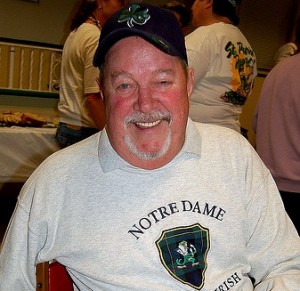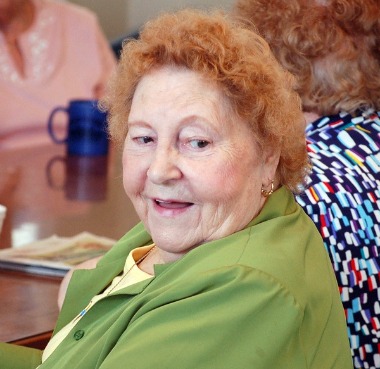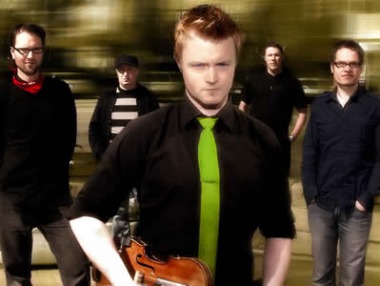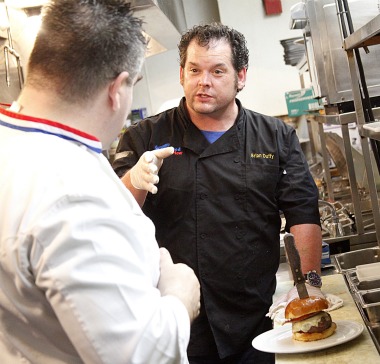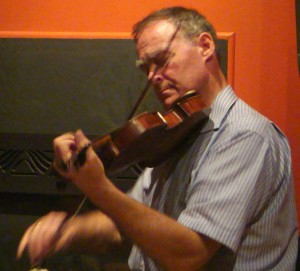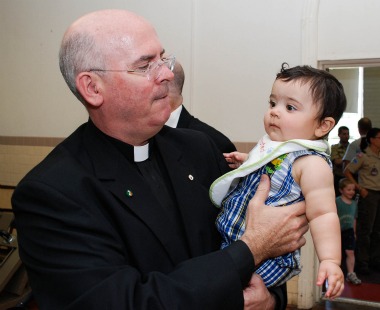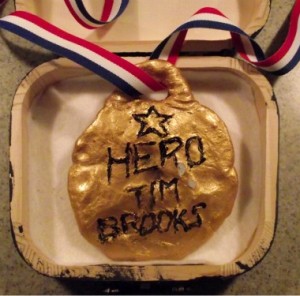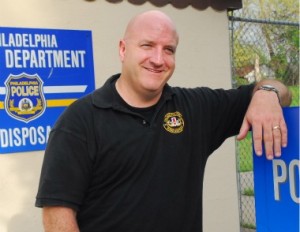Verne Leedom died this week at the age of 81.
A dozen years or so ago, when I joined Irish Thunder Pipes & Drums, Verne was the band’s drum major. He was out in front of the band, parade after parade—waving the mace, calling out the tunes, wearing the conspicuous fuzzy hat. That he somehow managed to do so at all, a big man with bum knees, is a tribute to his fortitude. And more than that, really. He just loved being drum major. We would have followed him anywhere, and not just because he was yelling at us to do so.
Out of uniform, Verne was every bit as memorable. You’d see him sitting at a table downstairs at the Ancient Order of Hibernians Notre Dame Division hall in Swedesburg, leaning back in his chair and quietly chatting with friends. There might be a dozen or so people in the room, but Verne was the one you’d notice. And it wasn’t because he was the loudest or the most boisterous. His voice carried when he needed it to—you could always hear him loud and clear, even way back in the highly distractable drum line. But he stood out because he was listening. Everyone else was talking; he was listening.
No one listened more intently. He had a talent for making you feel like whatever you had to say was the most fascinating thing anyone had ever said. It was no act. Verne was genuinely interested. His eyes were riveted on your face, his ears and mind were wide open to whatever you had to say, and his little gray goatee never failed to frame a smile if you said something funny. He smiled a lot.
And it wasn’t as if you were Verne’s friend for just that moment. Once you were in with Verne—and he seemed to be open to just about everybody—you were in forever. Verne never “unfriended” anyone that I know of. Even after I left the band to join another one, Verne never held a grudge. Fairly uncharacteristic for an Irishman, in my experience, and especially unexpected in the often catty little world of pipe bands. I would still run into him from time to time at parades, festivals or AOH functions. It didn’t matter whether months or years had gone by. Verne would extend his hand, and he would always ask me, “How are ya, lad?”
Which, when you come to think of it, is a funny thing to call a 60-year-old man.
So thanks to Verne Leedom for making me feel like a kid. I’m most decidedly not one, but I’ll take it. Mostly, though, thanks for showing all the rest of us what it really means to be a friend.
Godspeed, lad.
We asked a couple of Verne’s friends to add their thoughts. Here’s what they had to say:
Pete Hand
Irish Thunder Drum Major
After I joined the AOH Notre Dame Division in 1996, I hooked up with Verne right away. I became part of the Isle of Erin Degree Team that he was a part of. He served as a director on the Home Association with me. When I was president of the division he was my vice president for many years. When I joined the Irish Thunder Pipes and Drums as drum major he gave me some instructions since he had been a drum major. He also served with me on the Saint Patrick’s Parade Committee and the festival committee.
So as you can see, at the age of 82 Verne was very active. He attended everything and was still an officer of the AOH Montgomery County Board when he passed away Tuesday morning.
Verne use to call me almost every day to see how things were or to get some dirt on the goings on at the AOH. He and his wife Ann attended almost everything that came up with the AOH. He was also Grand Marshal of the Saint Patrick’s Day Parade when it was in Norristown.
Verne will be missed by all here at the Notre Dame Division. But I will also miss him very much. He always said he never had a brother but he always considered me a brother to him.
We are going to give him a good send off on Saturday at Saint Patrick’s Church in Norristown. That’s what he would have wanted.
Mick McBride
My name is Mick McBride, I was born in Donegal, Ireland, and moved to the States in 1990. I met Verne on a Thursday night the summer of 2001; the night I was sworn in as an AOH member. Verne and I hit it off right away. He always called me, “Mickey me lad.” A year later I joined the pipe band (Irish Thunder) which Verne was quartermaster of at the time, so he had the huge task of “dressing” me (fitting me for my band uniform).
My first ever dress with the band was as drum major for the Norristown St. Patrick’s Day parade in which coincidentally, Verne was nominated as Grand Marshal. As the band reached the grandstand, we halted and left faced toward Verne. I walked to the stage and presented Verne with the band mace and asked if he would do the honor of calling the next set as Verne was drum major of the band for a period of time. I could tell it was an emotional time for Verne and it was for me as well. Verne never saw this coming.
Verne was a very humble man, a very proud man and he held the AOH in his heart strongly, serving the many roles he participated in over the year with great honor, valor and dignity. His intentions were always sincere and in the best interest of the AOH, constantly striving to uphold the values of what the AOH stands for.
In addition to being an asset for the AOH, and a well respected Hibernian Brother across the state, Verne was a former semi-pro ball player who kept us entertained with wonderful stories of years past, but most importantly, Verne was a loving husband and wonderful father. He was so proud of his family and even in recent weeks as Verne’s health declined, he refused to miss his son Sean’s wedding.
I could sit for hours telling you all the exceptional qualities of Verne—the list goes on and on. Verne will be missed like words cannot explain. Verne and his wife Ann are such a huge part of the AOH and they were first in line to volunteer with so many events at the AOH. Verne will get a send off on Saturday like no other!!!
RIP, lad.

